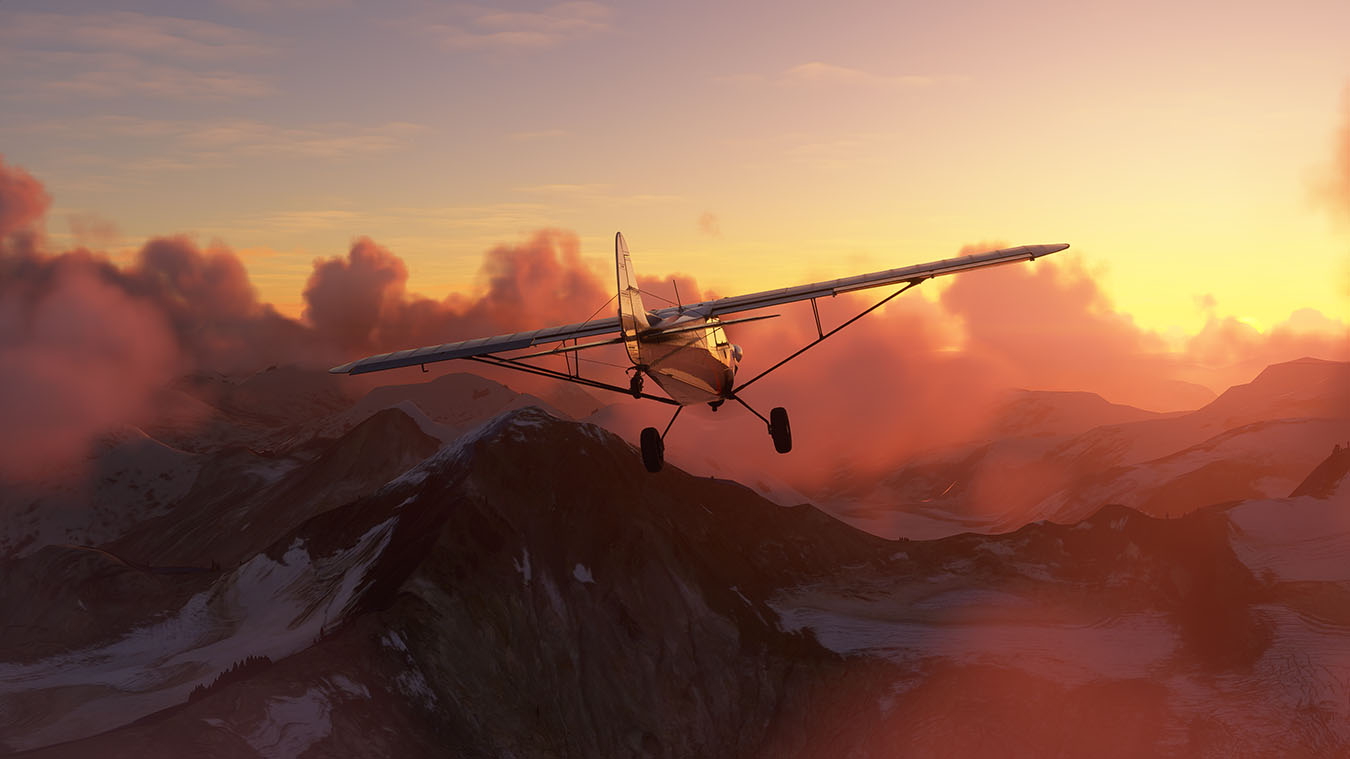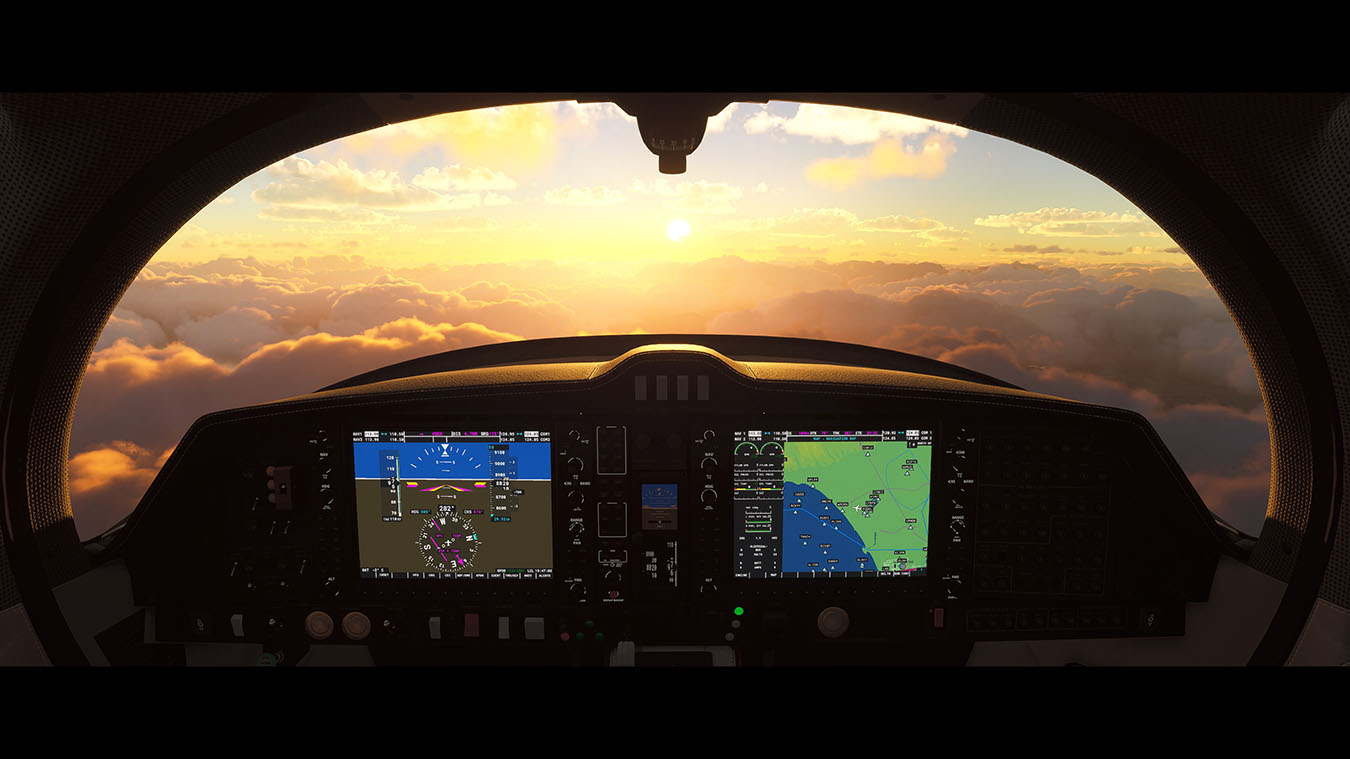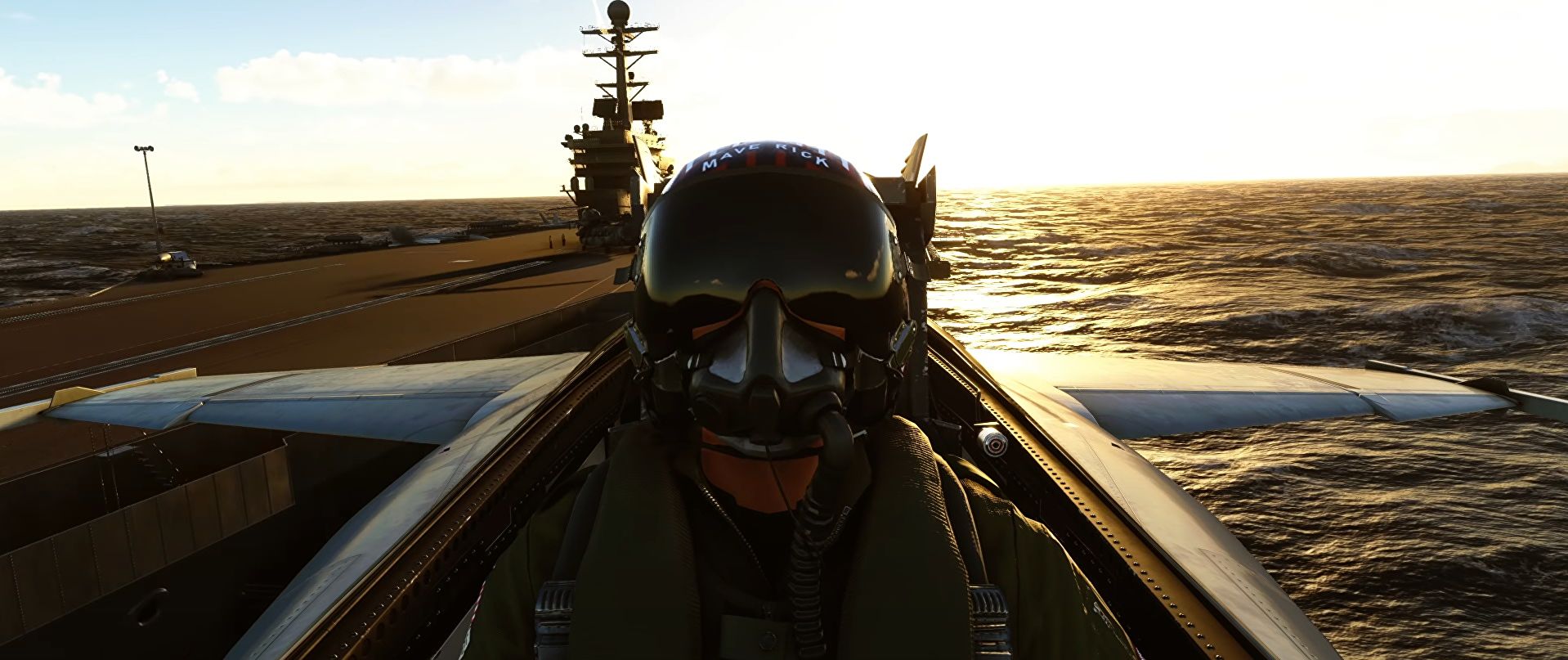One of 2020’s most acclaimed games was Microsoft Flight Simulator.
At a time when we were all stuck at home, the latest entry in Microsoft’s eponymous amateur flight sim series was celebrated for offering an opportunity to safely visit and explore different countries from all around the world.
And now, Microsoft Flight Simulator is coming to Xbox Series X/S, marking the series’ first-ever console release since it debuted in 1982.

Jorg Neumann.
“I always [point out] that it’s a got 40-year history — it’s one of oldest franchises in gaming. It’s the oldest thing we have at Microsoft — it predates Windows and Office, which is kind of crazy,” Jorg Neumann, head of Microsoft Flight Simulator, says with a laugh.
“It used to be that you had to have a pretty powerful computer, like a few-thousand-dollar computer. But now you can do it on a few-hundred-dollar console.”
Bringing the full Flight Sim experience to Xbox
As Neumann notes, “one of the attributes of the franchise is that it always pushes the PC as hard as [it] can.” In other words, the latest Flight Sim offers luscious, photorealistic visuals leveraging Microsoft’s Azure cloud computing tech alongside real-world data to simulate real-time weather and effects.
It’s a wonder, then, how the development team — which consists of both internal Microsoft employees and those at the French studio Asobo — managed to bring the game from a PC rig to consoles.
“Basically, the Xbox Series X and S are really powerful consoles. In my view, they’re much more PC-like than previous versions,” explains Neumann. “And this particular product uses the cloud a lot. We’re basically making heavy use of Azure; we store two-and-a-half kilobytes of data up there, we do a bunch of comput[ing], we do streaming… So when you look at the world, a lot of the world is actually streaming.”
He says the team’s mandate for the console version was that it “needs to look as good as it does on PC and needs to obviously play as good or better.” In practice, this means that the game supports native 4K on Series X, 2560p on Series S, and a locked 30 frames per second on both.
“We spent 10 months and optimized literally everything. We looked at the threading model, we looked at the terrain system, how we stream, what we stream, we put up more stuff into the cloud…” he says. “We’re super happy with where we landed.”
Of course, this being Microsoft Flight Simulator‘s console debut means that there will be many first-time players. With that in mind, Neumann says the team is expanding on what it learned from introducing newcomers to the PC version of the game last year to help welcome even more people on consoles.

“We took a step back and said, ‘Okay, how do we make people comfortable?” explains Neumann. “Because that’s really what it is — the regular folks who are not pilots or simmers, they look at an airplane sort of like it’s a spaceship and are like, ‘Yeah, that looks scary, I dunno!’”
To address that, Neumann says the team recreated the initial “discovery flights” that flight instructors take aspiring pilots on in the real world. “Basically, you walk up to some sort of airfield, there’s a flight instructor, they sit next to you, and they say, ‘okay, we’re taking you on a flight,’ and they literally put your hands on the steering wheel and say, ‘off you go.’ And then you take off, and like two minutes later, you’re in the air and you’re having this awesome feeling of swimming — it’s very much like swimming in the air.”
“We actually looked at FIFA quite a bit. Basically, if you ever want to train bicycle kicks or something like that, it’s a very fun tutorial.”
He likens this to driving a car, except you “just have the steering wheel, but nothing else; you don’t brake, there’s no gas or anything.” Instead, players can simply jump into curated locations, such as Mount Everest or Rio de Janeiro, to get a feel for flying. Ideal weather conditions will also be applied for smooth flying. Discovery Flights were tested “quite a bit” with a newcomer audience and proved quite popular, notes Neumann. “They felt empowered.”
On top of introducing Discovery Flights, Neumann says the team has retooled the eight tutorials that were in the PC version while adding 14 new ones. “I would say they’re pretty long, kind of complicated, and in the end, people did them, but when we asked them a bunch of questions about how much they actually remembered, it was pretty low,” says Neumann of the original PC tutorials.

Instead, the new console tutorials are designed to be shorter and more focused, he says. “We actually looked at FIFA quite a bit. Basically, if you ever want to train bicycle kicks or something like that, it’s a very fun tutorial. You basically just keep kicking bicycle kicks until you’re perfect. And we took that general concept and said, ‘let’s keep it short, let’s give clear feedback of what went well and what doesn’t go well, and where you can improve and then give it a score.’
He says adding that extra layer to tutorials encourages players to go back and practice. “When you see a score, you’re like, ‘I can beat that, I’m better than this!’ So they actually started playing the tutorial again and again and again,” he says. “And by doing so — and that’s what we’ve seen also with the newcomers — you learn by repetition. And so we made it more fun to actually go through the tutorials, but you actually retain what we’re trying to explain to you.”
“…You can actually enjoy it without any stress.”
When you’re confident enough to embark on a real flight, Neumann says there are a number of new tools to assist you, including the ‘Flight Assistant.’ This came about, he says, from common concerns from PC players that taking their hands off the steering wheel or looking out the window would lead to crashing.
“So basically, [Flight Assistant] scans the area of all the interesting places that are surrounding you, and if you select the Statue of [Christ the] Redeemer, or Statue of Liberty, or whatever that might be, the autopilot flies you there, and flies you around that object. So you can basically take your hands off, you can look outside, and you can actually enjoy it without any stress.”
Other features that have been added to assist players include auto-recovery if you go into an uncontrolled spin, more detailed maps with the names of places and landmarks, and the option to land anywhere.
Changing how you play

Of course, there are official peripherals like flight sticks and mice and keyboard combos to enhance the experience. “To me, it’s functionally very similar, but it’s a choice of immersion,” Neumann, who has experience flying in the real world, says of these accessories. “It feels super authentic.”
But he also wants to reassure players that these peripherals aren’t required at all; the experience is fully playable on a standard Xbox controller. For him, the key principle was that Flight Simulator on Xbox “needs to fully work and it needs to be intuitive with just a controller,” given that all console owners have one.
“With some of those cockpits on the flight computer, essentially, your fingers are typing a bunch of stuff. You don’t want to do that with ‘A,’ ‘B’ ‘X’ and ‘Y,’” he says with a laugh. “So there’s now a cursor mode, so with a thumbstick, you can go over and all you press is A and you can type because it’s basically a keyboard in the cockpit.”
But regardless of the control scheme that you use, Neumann says he’s most curious how Xbox gamers will take to Flight Simulator‘s online multiplayer, considering how “social” they are.
“People sometimes take [flying] as a sort of as an individual pursuit, like ‘it’s me and my plane.’ But that’s not really true in the real world,” he says. “When you really check it out, what aviators do, there are bush pilots that go on a trip together. It’s literally like you go on a camping trip. And I’m so curious to see how Xbox gamers will react to this.”

To that point, he notes that the Flight Sim community already has events where hundreds of PC players will embark on trips together, like a flight down the Pacific Coast. “I’m so curious to see, because Xbox gamers are very creative and very social, what they do with this. I can see all kinds of stuff — you can do formation flying, you can do acrobatic flying […] It’s a sandbox, right? What do you want to do in the sandbox?”
Flying ahead
With the exception of Flight Sim on Xbox lacking the VR functionality that’s available on PC, the two versions are virtually identical and, as a result, will receive the same long-term support. This includes world updates to Germany, Austria and Switzerland in August and the addition of helicopters in 2022. But what’s arguably the most interesting upcoming new content is the free Top Gun: Maverick expansion that’s set to release this fall.
With the long-awaited Tom Cruise-led film sequel still not out due to multiple COVID-19 related delays, Neumann notes that he isn’t at liberty to say much about the expansion at the moment. However, he did tease that it’s coming together well.
“It was just a perfect storm of two things coming together,” he says of Paramount initially approaching Xbox about a potential crossover. “I got to talk to [producer] Jerry Bruckheimer and [Joseph] Kosinski, the director, and then basically come up with, ‘how are we going to do this? What are we doing? How do we make this an authentic thing?’ Because we are, fundamentally, an authentic aviation experience — that is what we want. And the movie is, obviously, an actual movie […] [But] you could tell that Kosinski is a super smart guy. It was interesting how much he knew about [flying].”

Neumann says he’s been enjoying the collaboration as Kosinski and the Flight Simulator team share their knowledge of naval aviators (“top guns”). “Ultimately, there are things that you need to train for to become a top gun. And then it’s all about going fast. There are certain training programs, so you have to go low and fast, and there are all kinds of cool things. We’re playing it [the Top Gun expansion] and it’s super cool.”
Also on the horizon for Microsoft Flight Simulator is Xbox Cloud Gaming. The sim made headlines last month when Xbox confirmed that it would be the first of “many” otherwise current-gen-only games to come to the last-gen Xbox One via Xbox Game Pass’ streaming feature. While Xbox isn’t yet talking about a release date for this cloud version, Neumann is quite bullish on its potential.
“It was just a perfect storm of two things coming together.”
“With Flight Sim, the interesting thing is that it’s already streaming. When you think about it, you don’t have the world on your computer or on your Xbox — it’s up in the cloud. All that stuff streams down,” says Neumann. “We do [some] operations — mostly with the cockpit and the instruments and some of the physics calculations — locally, but it’s easily offset. So when you log into a VM [virtual machine] up on Azure, it’s actually identical. I’ve seen the tests — I’ve seen it run on 2013 laptops that are now 200 bucks, and it really works.”
For Neumann, Cloud Gaming, just like the new console port, presents an opportunity to let even more people experience the joys of flying. “I always think flying is a very intrinsic human dream. At some point as a species, we looked at the birds and were like, ‘man, that’d be kind of cool.’ And I think that’s everywhere — it’s worldwide,” he says. “So it makes me happy that socioeconomic differences will matter much less to be able to participate in the hobby. Everybody can at least try; if people were sort of like ‘oh, I always wanted to fly, I wonder what this is like,’ — well, now you can.”
This interview has been edited for language and clarity.
Microsoft Flight Simulator is now available on PC and Xbox Series X/S. The game can be purchased for $79 CAD or played at no additional cost as part of a Game Pass membership.
For more on Microsoft Flight Simulator, check out Brad Bennett’s impressions of the game’s PC version.
Image credit: Xbox

